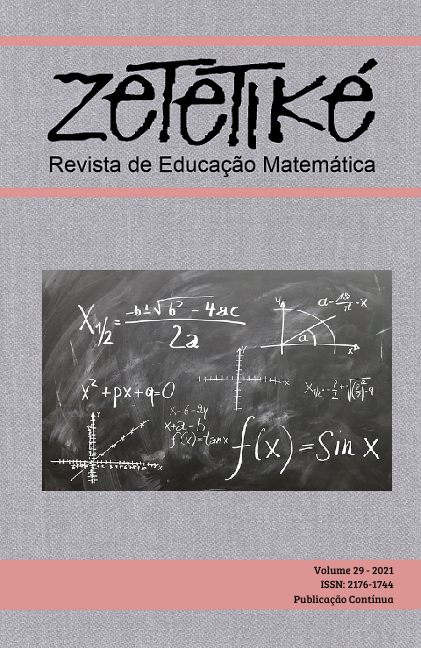Abstract
This research focuses on understanding the specialized knowledge that a mathematics teacher has in relation to subtraction, in whose teaching process uses Open Algorithms Based on Numbers (ABN method), using the Mathematics Teacher Specialized Knowledge (MTSK) model to your analysis. Therefore, it has carried out a case study about a second primary teacher from Concerted School in Huelva. On the other hand, the transcripts of the recordings of four activities in which the subtraction is worked, as well as from a subsequent semi-structured interview have obtained evidences and indications that show the teacher has specialized knowledge in subdomains about knowledge of contents and didactic knowledge, which allow us to presume a relationship between theses knowledges and teacher training in the ABN method.
References
Ablewhite, R. C., y Paret, A. M. L. (1971). Las matemáticas y los menos dotados. Madrid: Morata.
Aguilar, A., Carreño, E., Carrillo, J., Climent, N., Contreras, L., Escudero, D., … Rojas, N. (2013). El Conocimiento Especializado del Profesor de Matemáticas: MTSK. Actas del VII CIBEM (pp.5063- 5069). Montevideo: CIBEM.
Ball, D. L., Thames, M.H., & Phelps, G. (2008). Content Knowledge for teaching: What makes it special? Journal of teacher education, 59, 389- 407.
Bassey, M. (1999). Case study research in educational settings. Buckingham: McGraw-Hill Education.
Bracho-López, R. (2013). Menos reglas y más sentido: alternativas metodológicas a los algoritmos de cálculo tradicionales para el desarrollo del sentido numérico en la educación primaria. Actas del VII CIBEM (pp. 70-77). Montevideo: CIBEM.
Bracho-López, R., Adamuz-Povedano, N., Gallego-Espejo, M. C., & Jiménez-Fanjul, N. (2014). Alternativa metodológica para el desarrollo integral del sentido numérico en niños y niñas de primer ciclo de educación primaria. In M. T. González, M. Codes, D. Arnau and T. Ortega (Eds.), Investigación en Educación Matemática XVIII (pp. 161-176). Salamanca: SEIEM.
Bracho-López, R., Adamuz-Povedano, N., Jiménez-Fanjul, N., & Gallego-Espejo, M. C. (2014). Una experiencia de investigación-acción colaborativa para el desarrollo del sentido numérico en los primeros años de aprendizaje matemático. In J. L. González, J. A. Fernández-Plaza, E. Castro-Rodríguez, M. T. Sánchez-Compaña, C. Fernández, J. L. Lupiáñez and L. Puig (Eds.), Investigaciones en Pensamiento Numérico y Algebraico e Historia de las Matemáticas y Educación Matemática (pp. 1-9). Málaga: Departamento de Didáctica de las Matemáticas, de las Ciencias Sociales y de las Ciencias Experimentales y SEIEM.
Bracho-López, R., Gallego-Espejo, M., Adamuz-Povedano, N., &Jiménez-Fanjul, N. (2014). Impacto escolar de la metodología basada en algoritmos ABN en niños y niñas de primer ciclo de Educación Primaria. Revista Iberoamericana de Educación Matemática, 39, 97-109.
Brown, R., y Burton, R. (1978). Diagnostic models for procedural in basic mathematical skills. Cognitive Science, 2, 155-192.
Canto, M.C. (2014). Curso: Método ABN. Primer ciclo (Por unas matemáticas sencillas, naturales y divertidas). Ronda: CEP de Ronda. Recuperado de https://calculoabn.com/0.1/wordpress/4.7.z/wp-content/uploads/abn-primer-ciclo-2.pdf
Carpenter, T., Franke, M., Jacobs, V., & Fennema, E. (1996). Invention and understanding in the development of multidigit addition and subtraction procedures: A longitudinal study. Annual meeting of the American Research Association: New York.
Carrillo, J., Climent, N., Contreras, L. C., & Muñoz-Catalán, M. D. C. (2013). Determining specialised knowledge for mathematics teaching. In B. Ubuz, et al (Ed.), VIII Congress of the European Society for Research in Matehematics Education (CERME 8) (pp. 2985-2994). Antalya, Turkey: Middle East Technical University, Ankara.
Carrillo, J., Climent, N., Montes, M., Contreras, L.C., Flores-Medrano, E., Escudero-Ávila, D., Vasco-Mora, D., Rojas, N., Flores, P., Aguilar-González, A., Ribeiro, M., & Muñoz-Catalan, M.C. (2018). The Mathematics Teacher’s Specialised Knowledge (MTSK) model. Research in Mathematics Education, 20(3), 236-253. https://doi.org/10.1080/14794802.2018.1479981
Carrillo, J., Contreras, L.C., & Montes, M. (2013). Conocimiento del profesor de Matemáticas: Enfoques del MKT y del MTSK. In A. Berciano, G. Gutiérrez, A. Estepa and N. Climent (Eds.), Investigación en Educación Matemática XXI (pp. 404-410). Bilbao: SEIEM.
Castro, E., Rico, L., & Castro, E. (1987). Números y operaciones. Fundamentos para una aritmética escolar. Madrid: Síntesis.
Fuson, K. (1992). Research on Whole Number Addition and Subtraction. In D. A. Grouws (Ed.), Handbook of Research on Mathematics Teaching and Learning: a project of the National Council of Teachers of Mathematics (pp. 243-275). New York: Maxwell Macmillan International.
Martínez, J. (2011). El método de cálculo abierto basado en números (ABN) como alternativa de futuro respecto a los métodos tradicionales cerrados basados en cifras (CBC). Bordón. Revista de pedagogía, 63 (4), 95-110.
Martínez, J. (2018). El cálculo ABN. Un enfoque diferente para el aprendizaje del cálculo y las matemáticas. Padres y Maestros/Journal of parents and teachers, 376, 52-59.
Maza, C. (1991). La enseñanza de la suma y de la resta. Madrid: Síntesis.
Muñoz Catalán, M. C. (2009). El desarrollo profesional en un entorno colaborativo centrado en la enseñanza de las matemáticas: el caso de una maestra novel. Tesis doctoral. Universidad de Huelva, Huelva.
Stake, R. E. (2005). Qualitative Case Studies. En N. K. Denzin y Y. S. Lincoln (Eds.), The Sage handbook of qualitative research (p. 443–466). London: Sage.
Shulman, L. S. (1986). Those Who Understand: Knowledge growth in teaching. Educational Research, 15 (2), 4-14.
Shulman, L. S. (1987). Conocimiento y enseñanza. Harvard Educational Review, 57(1), 163-196.

This work is licensed under a Creative Commons Attribution-NonCommercial-NoDerivatives 4.0 International License.
Copyright (c) 2021 Zetetiké


